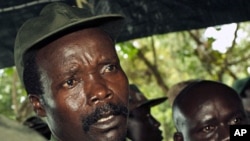While a U.S.-made social media awareness campaign against a wanted Ugandan rebel leader has been hugely successful in terms of attention, it has also created a blizzard of commentary, some of which has become viral in its own way.
Commentary by government officials, human rights activists, scholars and ordinary citizens has been continuing at a rapid clip days after the U.S.-group Invisible Children released a 29-minute video which has been viewed tens of millions of times.
One popular method has been to post a video response.
Ugandan blogger Rosebell Kagumire has become a celebrity in her own right, fielding multiple media interviews, and receiving thousands of emails since posting her own video.
Like others, she complains about how the widely watched video has an American narrator and central character, filmmaker Jason Russell, portraying himself as a video crusader for justice in Africa. “This is another video where I see an outsider trying to be a hero, rescuing African children. We have seen these stories a lot in Ethiopia. Celebrities coming in Somalia. It does not end the problem. I think we need to have sound intelligent campaigns that are geared towards real policy shifts rather than a very sensationalized story that is out to make just one person cry and at the end of the day, we forget about it," she said.
Amid the mounting criticism, the filmmaker himself made a new video, thanking all the viewers and responding to some of the concerns.
Russell has also defended the way he made his movie. It shows how he educates his own son about how other children, the LRA’s roving child soldiers and their victims, are being abused. “We just want to thank you. Thank you for believing in the story that we know is going to change the world. It is going to change the world. And we know there are a lot of questions out there. We see them online. We have been reading them and we have provided a new page on our website that answers a lot of those questions so just please go there and read for yourself our very clear answers because this is not our movement. It is a name. It is Invisible Children but it is your movement, you started this with your money and we are here to serve you," he said.
The movie contains lots of images of U.S. high school students protesting, raising their fists in unison.
The website also has several links to donate, where small amounts of contributions are suggested.
It also sells tee-shirts, bracelets, stickers, buttons, posters, all of which can be bought in a so-called action kit.
The movie and website call on young Americans to lobby their lawmakers so the U.S. government can keep pushing in its fight against the LRA. The campaign also asks people to take part in a poster campaign April 20, plastering as many as possible to call for Kony’s capture this year.
Last year, the Obama administration sent 100 military advisors to Central Africa to help Uganda’s military and other African security forces wipe out the LRA.
The group, which now has an estimated several hundred members, continues to wage attacks, mostly in the Democratic Republic of Congo.
Experts believe the group’s leaders, including Kony, if he is still alive, are hiding in the remote and difficult to operate terrain of the Central African Republic.
The group, which was originally based in northern Uganda, has been waging attacks on civilians, including mutilating their faces and abducting children, for over two decades.
For years, it has been a favorite target of U.S. activist groups and lawmakers interested in Africa.
In 2005, the International Criminal Court issued an arrest warrant for Kony to face charges of crimes against humanity, but he has eluded capture, including during a previous 2008 U.S.-aided military effort.
Mark Drumbl, a law professor at Washington and Lee University, is also concerned about the scope of the movie’s stated goal, which is to obtain Kony’s capture.
Drumbl is an expert on child soldiers who wrote a book called “Reimagining Child Soldiers in International Law and Policy.” “The end game of the video is the capture of Joseph Kony. However, the capture of Joseph Kony and his arrest and let us say his prosecution and conviction by the International Criminal Court is no panacea. It is not necessarily going to stop LRA activity nor is that necessarily going to bring justice to the many victims. Criminal law is a small slice of an overall justice conversation. And at the end of the day, we cannot substitute the western ideal of justice for what many local communities may most want which is peace, stability, reconciliation and moving on, and I think we need to tread carefully," he said.
Other common criticism of the video has been that a focus on capturing Kony may militarize the situation even further, with more help for security forces also known for committing abuses, while taking away from other priorities such as pushing for better development and governance in the very marginalized affected areas.
News
Kony Campaign Creates Blizzard of Commentary and Concerns




